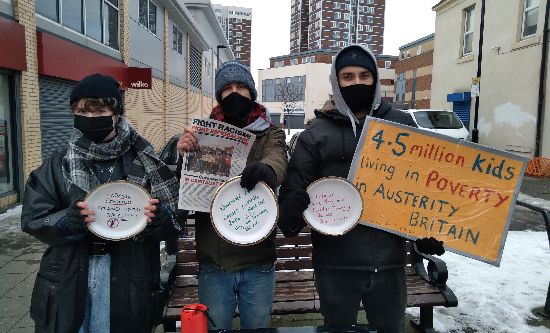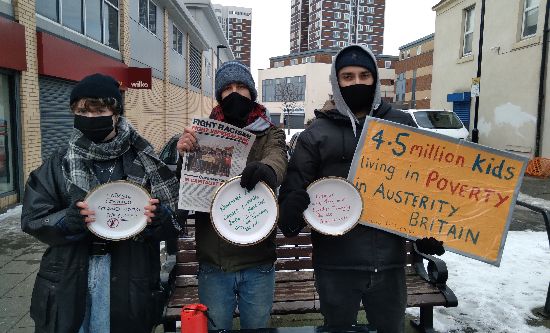
The government has pursued a scorched earth policy in its war on the poor. A sustained, unbridled and vicious attack on local services has left them cut to the bone, enabled by the compliance of predominantly Labour councils. The ideological offensive on the public sector that followed the financial crash of 2008/09 laid the groundwork for the last 11 years of council cuts. This has left councils on the brink of collapse with many facing bankruptcy and many more years of cutbacks to come.
The spending power of councils has been reduced by a third over this period even though demand has soared as more and more people are hit by job losses, benefit cuts and evictions. Those in poverty have fewer and fewer avenues to turn to for support. 25 councils in England are at a high or acute risk of financial failure. Social care for the elderly and disabled, spending on special education needs and homelessness, libraries, theatres, community centres, bin collections and bus routes are to be cut back even further in April while, in a move to make residents shoulder the cost of adult social care, council tax is being increased by 5% for another year.
On 10 March 2021, the National Audit Office (NAO) released a report on local government finance in the pandemic. It states that local authorities reported in December 2020 an estimated £9.7bn of pandemic-related cost pressures and losses for 2020/21. This includes extra costs for PPE, and losses in sales and charges from parking, leisure centres, museums and so on. Falls in revenue from council tax and business rates will have a serious impact on next year’s budgets.
The government has pledged an estimated £9.1bn cash injection for 2021/22 to, in the NAO’s words, ‘avert system-wide financial failure’. However, this short-term funding still leaves a shortfall of £605m. 75% of authorities have been left with a funding gap. In the Labour borough of Newham, the pandemic has cost the council £12m more than the £68m provided by government. As many as 94% of single tier and county councils expect to make cuts to services in 2021/22. Only 52% said they were confident of being able to set and implement ‘balanced budgets’. 82% of district councils are planning on using reserves to support planned spending. Already in 2018, according to the NAO, many councils were only just managing to provide statutory social care services by dipping into reserves. The organisation predicted then that within three years one in 10 councils with social care obligations would have exhausted their reserves. Now is the time of reckoning.
In the last year, Croydon council declared itself insolvent, and had a £120m emergency loan approved at the beginning of March. Wirral, Luton, Eastbourne, Bexley and Peterborough have received a total of £109m in government bailout loans to keep them from bankruptcy. Slough and Nottingham are awaiting decisions from the government on £10m and £30m worth of loans respectively. At least 12 councils in England are in emergency talks with the government in a bid to stave of bankruptcy.
Areas where the poorest sections of the working class live have faced the steepest cuts. These tend to be Labour councils. Research carried out by The Guardian last year showed that 38 of the 50 worst hit councils were Labour controlled while only five were Conservative. Changes to the way central government grants are calculated and generally less revenue generated from council tax and business rates has meant less funding for these areas. Yet it would have been impossible for the government to carry out these levels of cuts without finding willing accomplices in Labour councillors. These careerists have not only failed to oppose the cuts but in many cases have actively undermined community campaigns against library and swimming pool closures and cuts to services. Meanwhile, the government’s so-called ‘levelling up’ fund, ostensibly aimed at the country’s most deprived areas, has seen Conservative areas win 39 out of 45 bids to receive a share of the initial £1bn handout. One is the Yorkshire constituency of Chancellor Rishi Sunak. The majority of lucky winners are in Northern and Midlands Conservative marginal seats.
The average council in the north-east saw a reduction in spending power of 34%. Not one Newcastle Labour councillor has voted against the cuts in the last ten years, cutting a grand total of £345m. Supporters of Fight Racism! Fight Imperialism! (FRFI) in Newcastle launched a campaign to fight this year’s round of cuts which saw the council vote for £40m of cuts on 3 March, including £400,000 to free school meals and £2m to the public health budget.
Out of a workforce of 4,500, Knowsley council in Liverpool has axed 2,000 jobs in ten years, and has raised council tax for the sixth consecutive year, up by 30%. Manchester council has cut £379m since 2010 and axed 4,000 full time posts – 40% of its workforce. It will vote on 31 March on cutting £2.3m from its homelessness budget and shedding another 160 jobs. This is Andy Burnham’s neck of the woods. On 8 March, Nottingham council voted in favour of cutting £15.6m on top of the £271m cut in the last decade. FRFI supporters in Nottingham have joined the community campaign to Save John Carroll leisure centre and swimming pool. Birmingham council is gearing up to cut another £121.2m by April 2025, including cutting adult social care by £7.8m a year.
Between 2010 and 2019 240,000 council jobs – 25% – have been axed. Of these, more than 108,000 were redundancies and more than 124,000 were transferred to private contractors. There were an estimated 20 councils where staff numbers have halved in the space of nine years. The unions have hummed and hawed about job losses, not bothering to lift a finger to fight the council cuts. What is needed is a sustained movement in local communities directed at both the government and Labour councils to fight the cuts and demand decent local services.
Mark Moncada
FIGHT RACISM! FIGHT IMPERIALISM! 281 April/May 2021




